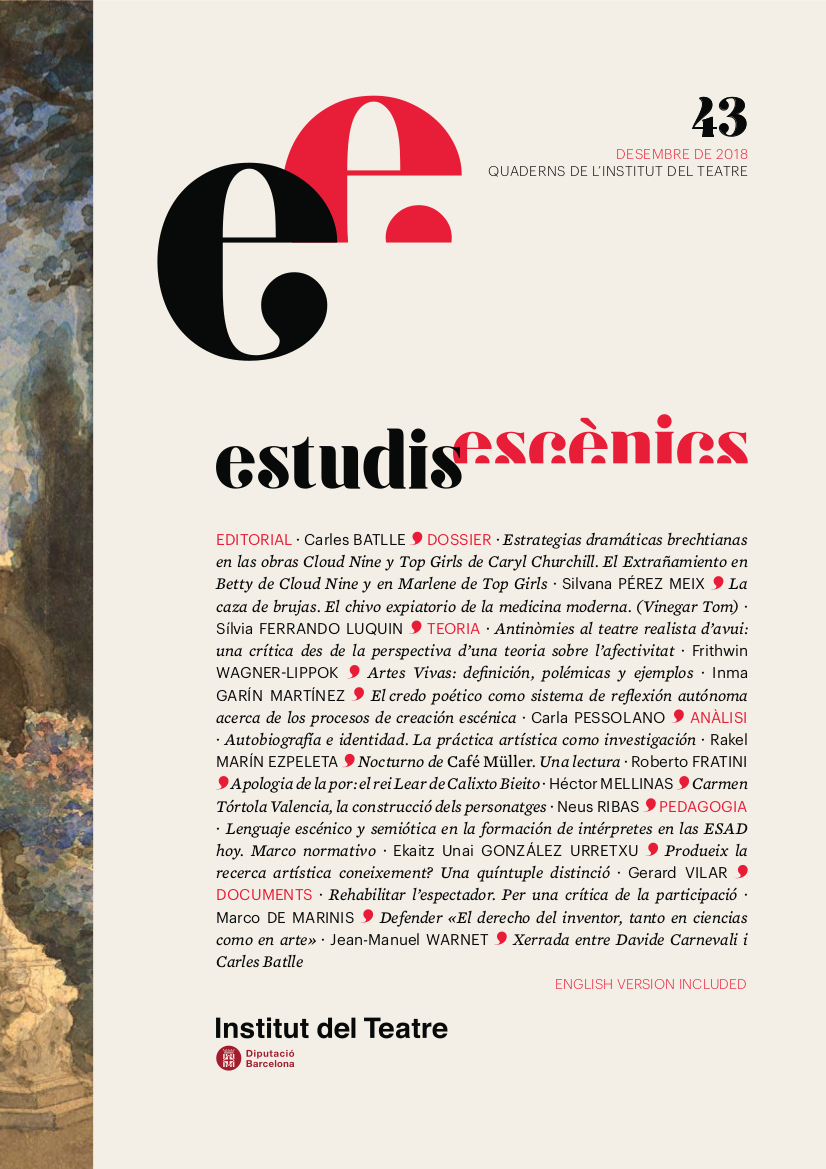El credo poético como sistema de reflexión autónoma acerca de los procesos de creación escénica
Paraules clau:
credo poético, procesos creativos, reflexión escénicaResum
En el presente trabajo introducimos la categoría de credo poético que hemos elaborado al problematizar los modos en que un artista escénico genera reflexión dentro de y en torno a su práctica. El credo poético de un artista escénico se conformará como un elemento en permanente evolución. Al estudiar los modos de pensamiento en las prácticas, se busca ver cuáles son las formas de reflexión que se generan dentro del campo artístico y cómo las mismas son tomadas en términos de producción de pensamiento acerca del mundo que conforma el entorno del creador.El aporte de este abordaje es que propone herramientas para un tipo de sistematización posible que deriva en la producción de insumos teóricos a partir de las prácticas artísticas. Se presentarán ejes de trabajo que funcionan como una formulación útil tanto para investigadores (interesados en el análisis de poéticas de artistas específicos), artistas investigadores o artistas que buscan sistematizar la reflexión acerca de sus propios procesos y prácticas.
Referències
AAVV. Detrás de escena, Buenos Aires: Editorial Excursiones, 2015.
Badiou, Alain. Imágenes y Palabras. Escritos sobre cine y teatro. Buenos Aires: Manantial, 2005.
Bak-Geler, Tibor. «Epistemología teatral». En: Revista de la asociación mexicana de investigación teatral 4. México, 2003, p. 81-88.
Bartís, Ricardo. Cancha con niebla. Buenos Aires: Atuel, 2003.
Briski, Norman. Mi política vida. Buenos Aires: Dunken, 2013.
Catalán, Alejandro. <http://alecatalan.blogspot.com.ar/>. [Consulta: 1 julio 2017].
De Certeau, Michel. La invención de lo cotidiano: 1 artes del hacer. México: Universidad Iberoamericana, Departamento de Historia Instituto Tecnológico y de Estudios Superiores de Occidente, 2000.
Diéguez Caballero, Ileana. Escenarios liminales: teatralidades, performance y política. Buenos Aires: Atuel, 2007.
Frayling, Christopher & Royal College of Art. Research in art and design. Londres, Royal College of Art: 1993.
García Wehbi, Emilio. Botella en un mensaje. Obra reunida. Córdoba: Alción editora/ Ediciones Documenta/ Escénicas, 2012.
Geertz, Clifford. La interpretación de las culturas. Barcelona: Gedisa, 2003.
Genette, Gerard. Seuils, París: Éditions du Seuil, 1978 (Poétique).
Kartun, Mauricio. Escritos (1975-2005). Buenos Aires: Colihue, 2006.
Lacoue-Labarthe, Philippe; Nancy, Jean-Luc. El absoluto literario: teoría de la literatura del romanticismo alemán. Traducción de Cecilia González y Laura Caraugari. Buenos Aires: Eterna Cadencia, 2012.
Laino, Norberto; Pessolano, Carla. Hacia un lenguaje escenográfico. Buenos Aires: Editorial Colihue, 2013.
Nelson, Robin. Practice as research in the arts: principles, protocols, pedagogies, resistances. Houndmills, Basingstoke, Hampshire; New York: Palgrave Macmillan, 2013.
Rosenzvaig, Marcos. Las artes que atraviesan el teatro. Buenos Aires: Capital Intelectual, 2012.
— Técnicas actorales contemporáneas II, las poéticas de 15 maestros del presente. Buenos Aires: Capital Intelectual, 2015.
Sagaseta (comp.) [et al.]. Encuentros. Buenos Aires: Nueva Generación, 2011.
Szuchmacher, Rubén. Lo incapturable. Buenos Aires: Reservoir Books, 2015.














